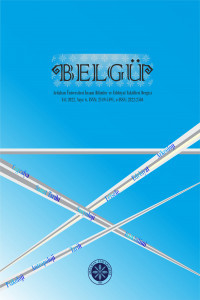Mitolojik İllustrasyonlar ve Bunların Pieter Brueghel'ın Resimleri ile William Carlos Williams'ın Şiirlerinde İfade Ediliş Biçimleri
Mitoloji, farklı kültürleri bir araya getirdiği ve insanların iletişiminde ortak bir dil yarattığı için evrensel bir gerçekliktir. Mitolojinin gücü o kadar güçlüdür ki 15. yüzyılda yaşamış ressam Pieter Brueghel ile 20. yüzyılda yaşamış şair William Carlos Williams ortak bir noktada buluşur. Williams Brueghel’ın resimlerini Kunsthistorishes Müzesi’nde gördüğünde, bunlarla ilgili şiir yazmaya karar verir ve bu şiirler ekfrasis şiirler olarak tanımlanır. Bu sanatsal yapıtlar mitolojik öyküleri içinde barındırır. Bu çalışma, şiirlerin mitsel ögeleri nasıl ifade ettiğini gösterecektir. Kelimeler ve resimler arasında bir köprü oluşturan araştırma, kültürel ifadeleri William ve Brueghel’ın eserlerinde örneklendirecektir. Bu noktada, mitoloji her yerdedir ve etkileri tarihte hala devam eden süreçleri vurgulamaktadır. Mit ya da mitoloji, insanların zihninde her zaman üstün bir kavramdır ve onun üstün gücü, sonsuz illüstrasyonlar ile kendini gösterir. Pieter Brueghel bu gücü kullanan artistlerden biridir. Onun resimlerinde pek çok mitolojik referanslar vardır ve Brueghel’ın dönemini anlamak açısından her biri öğretici niteliktedir. Bu mitolojik örnekler William Carlos Williams ile kelimeler aracılığıyla 20. Yüzyılda tekrar hayat bulur ve çok farklı yüzyılları birleştirir. Mitoloji niçin evrensel bir gerçekliktir? Hangi yönlerden Williams ve Brueghel sanatlarında bunu kullanır? Sanatta mitolojik yansımaların özü nedir? Bu çalışma, sizi bir gezinti gibi 15. yüzyıldan 20. yüzyıla götürecektir.
MYTHOLOGICAL ILLUSTRATIONS AND THEIR CULTURAL REPRESENTATIONS IN PIETER BRUEGHEL’S PAINTINGS AND WILLIAM CARLOS WILLIAMS’ POEMS
Mythology is a universal truth because of connecting diverse cultures in that it creates a common language that all people communicate each other. The power of mythology is so strong that 15th century painter Pieter Brueghel connects to 20th century poet William Carlos Williams. Mythology here plays an important role in the cultural flows between two different centuries. When Williams sees the masterpieces of Brueghel in Kunsthistorishes Museum, he writes poems about them and these ekphrastic poems involve in mythological representations. This paper tells how these poems will be created besides the illustrations of mythic figures. The bridge between words and images merges with the mythology in the context of cultural responses of Williams and Brueghel. At that point, it can be said that mythology is omnipresent and its effects are continuing as an on-going process throughout history and so it does. Myth or mythology is always a superior notion and in the minds of humanity in that the ultimate power gives eternal illustrations to people. Pieter Brueghel is one of them who uses this power in his masterpieces. There are many mythological references in his paintings and each is a great allegory for understanding the society in Brueghel’s period. These mythological embodiments are transferred into the words of William Carlos Williams and it indicates how two different centuries meet with an intimate connection in the context of mythology. Why is the mythology a universal reality? From which perspectives did Williams and Brueghel deal with myth in their works? What is the essence of mythological representations in art? This paper tries to reveal these questions and it will take you from 15th to 20th century like a journey.
___
- Ar, G. (2020). Words and Images. Master Thesis, (YÖKTEZ).
- Bolton, L. (2002). The Everything Classical Mythology Book: Greek and Roman Gods, Goddesses, Heroes, and Monsters from Ares to Zeus. Avon, Mass: Adams Media Corp.
- Goldhill, S. (2007). “What Is Ekphrasis For?” Classical Philology, Vol. 102, No. 1.
- Hamilton, E. (2011). Mythology. Grand Central Publishing.
- Lee, R. W. (1940). “Ut Pictura Poesis: The Humanistic Theory of Painting.” The Art Bulletin, Vol. 22, No. 4 Dec.
- Friedländer, M. J. (1976). Early Netherlandish Painting Pieter Bruegel, translated by Heinz Norden. Leyden, The Netherlands.
- Williams, W. C. (1962). Pictures from Brueghel and Other Poems. America: New Directions.
- Williams, W. C. (1977). I Wanted to Write a Poem: The Autobiography of the Works of a Poet, edited by Edith Heal. New Directions.
